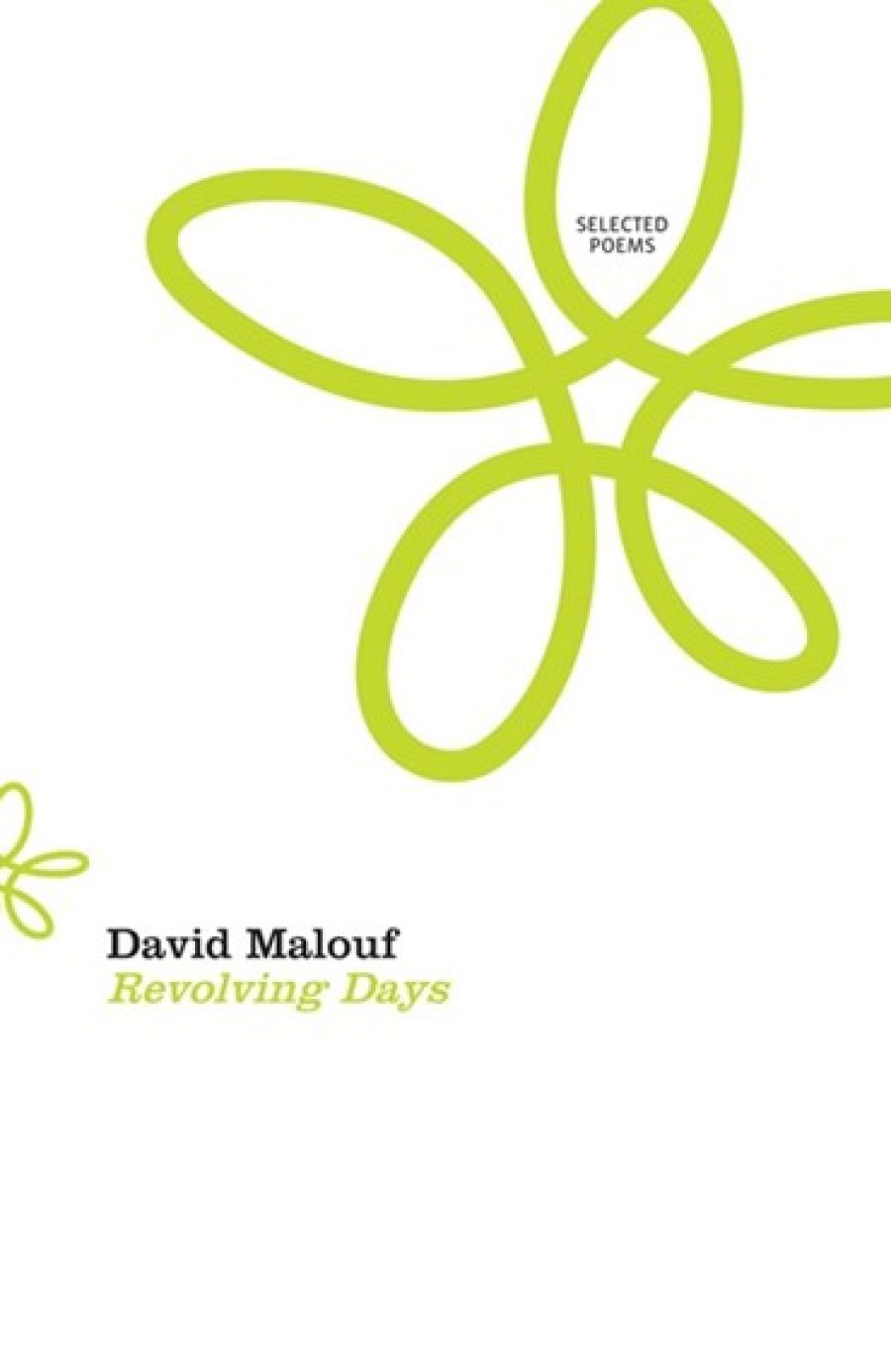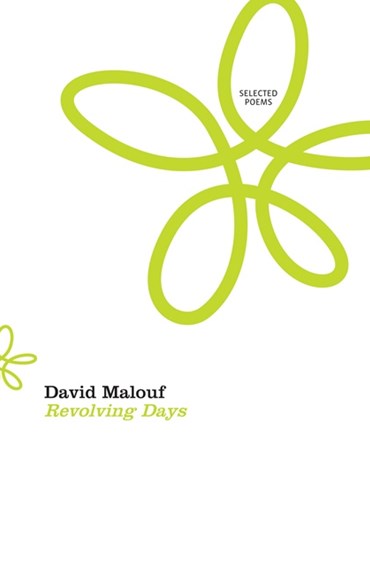
- Free Article: No
- Contents Category: Poetry
- Review Article: Yes
- Article Title: Miniature marvels
- Online Only: No
- Custom Highlight Text:
David Malouf’s Typewriter Music (2007) recently reminded readers that Malouf is a masterful poet. It was also evidence of an especially successful period in Malouf’s glittering career, appearing only a year after the highly praised collection of short stories, Every Move You Make (2006), and in the same year as The Complete Stories (2007). Now with the publication of Malouf’s latest Selected Poems, Revolving Days, we can see that this late efflorescence of poetry and short fiction suggests what might have been evident all along: that Malouf works best within a small frame. Malouf, who began as a poet in the 1960s, has – despite some flirtation with the epic mode – consistently shown himself to be interested in compact forms: the lyric poem, the short story, the essay, the libretto, and the novella.
- Book 1 Title: Revolving Days
- Book 1 Subtitle: Selected Poems
- Book 1 Biblio: UQP, $26.95 pb,198 pp
- Book 1 Cover Small (400 x 600):

- Book 1 Cover (800 x 1200):

Malouf’s attraction to these more constrained forms is consistent with the fact that he is writer of details, of the quotidian, of the minute. Things of the world in their startling quiddity and strangeness powerfully occupy Malouf’s poems, usually in domestic and diurnal contexts: meals, houses, mornings, night, sleep, weather. In ‘Harvest Month’, we read that ‘Big clouds like haystacks circle / the night.’ In ‘The Little Aeneid’, ‘Night / came on, the city slept / behind iron-lace verandahs,/ the first trams rattled in’. In the superb ‘Poem’, one of a number of love poems notable for their obliquity as much as their intensity, we read:
Entering a winter
room I find myself
dazzled: all summer
in the throats of vases, windows
ablaze with air, our pear tree
brimming with wasps.
(The fine enjambment after ‘I find myself’ shows Malouf’s intense craftsmanship, where an interest in technical detail is continuous with a thematic interest in the detail of life). In ‘Snow’, we find ‘horses snuffing // at thunder in the grass’. In ‘Bicycle’, the eponymous machine is a ‘tall metallic insect’. In ‘A to Z’, ‘A new week breaks into / the yard’, while in ‘Off the Map’, ‘headlamps dazzle / the leaves’.
As all of these examples illustrate, Malouf’s interest in things and their everyday habitations is part of a wider interest in the transformational potential of poetry. So, in ‘Poem’, for instance, winter is transformed into a time of plenitude (‘windows / ablaze’, ‘our pear tree / brimming’), while in ‘Off the Map’, the leaves are personified enough for them to be ‘dazzled’ by headlights. The description of the bicycle in ‘Bicycle’ shows an almost ‘Martian’ interest in poetry as a riddling thing that defamiliarises the everyday world. We see this elsewhere in Revolving Days, such as in ‘First Night’ (in which ‘The pears / might be garden tools, the laundry hay, the ironing-board an angel / disguised by birthday wrappings’) and in the last section of ‘An Essay on Angels – the short version’, in which the unnamed subject is the penis, ‘Curled up like candied peel / in there / somewhere’. But Malouf is not Craig Raine, and these examples suggest more that the so-called Martian school was in fact engaged in paradigmatically poetic strategies that can be found in almost any time or place.
The theme of transformation so central to Malouf’s poetry is one that he has described elsewhere as essential to art generally. In A Spirit of Play (1998), Malouf’s collection of essays based on his 1998 Boyer Lectures, he argues that art is a matter of ‘enriching our awareness of what exists around us, making it register on our senses in the most vivid way; but also of taking all that into our consciousness and of giving it a second life there so that we possess the world we inhabit imaginatively as well as in fact’. As Malouf makes clear throughout his brilliant poetry, this factual possession of the world is always already an imaginative inhabitation. Inhabitation is indeed a common trope of Malouf’s work, which is repeatedly concerned with the ways we inhabit a body, a house, the weather and time.
But Malouf’s interest in habitation is not merely a more intense, lyrical version of House and Garden. His work is obsessed with the underside of things, with darkness and eroticism, and, perhaps most powerfully, with the troubling presence of history and death. In ‘The Crab Feast’, we see clearly the link between habitation and these more troubling concepts. The sequence opens with an arresting confusion of different forms of appetites, of eating and sex:
There is no getting closer
than this. My tongue slips into
the furthest, sweetest corner
of you. I knownow all your secrets.
When the shell
cracked there was nothing
between us. I taste moonlighttransformed into flesh
and the gas bubbles rising
off sewage.
As these last lines illustrate, transformation is the basis of all life, not only art. And as in the transformation of sewage into food, so the blood of history can be transformed into art. Such transformations account for some of the darkest and most startling moments in Revolving Days. For the most part, these moments rise out of Europe, where long shadows cast themselves over Malouf’s more pastoral poems about life in Tuscany or suburbia. In ‘Bad Dreams in Vienna’, for instance, ‘the shadow of empire’ is present from Charlemagne to the Nazis, while ‘a million dead turn in my sleep / as in the great wheel in the Prater turns on the breath of children sleeping // at Döbling, Rudolfsheim, the Freudian suburbs’. Even more startling is ‘The Little Panopticon’, a sequence of poems unlike anything else attempted by Malouf in his career. Each section is named after a classic European work (‘Religio Medici’, ‘The Interpretation of Dreams’) and goes towards producing an alternative European history, where the creatures of fable are bloodied, where Wagner becomes ‘theatre continued as politics’ in the guise of the Final Solution, and where ideologies raze villages: ‘absolute purity is the dead / in moonlit heaps, the charred black stumps // of forests.’ The poems make up a strange, surreal vision of a world that it part literature and part real tragedy. In the final section, ‘Grey’s Anatomy’, human biology – by dint of the opposable thumb – is presented as a bloody destiny: ‘Latecomer of five / agents recruited / to betray us, it’s the thumb, the thick, the blunt one, Machieval, / that draws them to a fist.’
As the poems suggest, Malouf’s attraction to the constrained form is matched by an implied epic perspective, open to the ancient and historical while taking readings of the quotidian. Titles such as ‘News from the Dark Ages’, Notes on an Undiscovered Continent’, Pieces for a Northern Winter’, The Little Aeneid’, ‘The Little Panopticon’, and ‘A Brief History of Tuscany’ all advert to Malouf’s ability to compose ‘little epics’, his transformation of the vast or monstrous into miniature marvels.
This is seen in the collection’s last poem, a free translation (one of a number of such transformations) of the poem allegedly written by Emperor Hadrian just before his death, ‘Animula vagula blandula’. Malouf’s seven versions of this little poem, “Seven Last Words of the Emperor Hadrian’, are a tour de force of wit and inventiveness. ‘Last words’ is the theme, too, of the collection’s penultimate poem, ‘At the Ferry’, in which the poet inhabits a world that is half real and half mythic. These visions of self-mortality, elegiac though they are, illustrate Malouf’s continued imaginative power, his wit, and his continued tryst in the expressive power of poetic technique and transformation (of myth, of languages, of experience, and of the self).
The poems in Revolving Days are arranged in a rough kind of chronological order relating to the poet’s life. Poems about childhood – regardless of when they were written – appear in Part One. These are followed by poems arising from Malouf’s experiences in Europe in the 1960s, and so on. This gives the book a neat, though not overly programmatic, shape. But it really wouldn’t matter how the poems were arranged. Poem after poem shows that Malouf has slowly built a small but powerful body of poetic work. It would not be too much to say that taken together they form a kind of masterpiece.


Comments powered by CComment